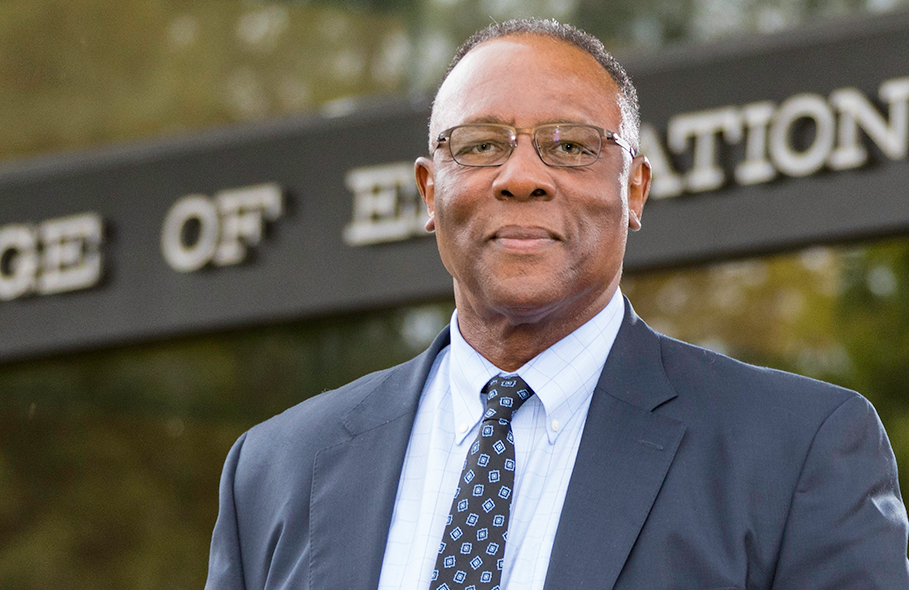Leading & Inspiring in Challenging Times
by Tom Hanlon / Jun 4, 2021

James D. Anderson is, according to one colleague, highly committed to changing the world for the better. Part of leadership is constantly managing change—something that Anderson has done exceptionally well as dean of the College of Education, both before and during the pandemic.
In 1994, when James D. Anderson was beginning what would become a 23-year tenure as head of what is now known as the Department of Education Policy, Organization and Leadership (EPOL) in the College of Education, he approached the former head of the department, Clarence Karier, to ask him a question.
“I know you don’t like to give advice,” Anderson said, “but if you could give me one thing to remember in this role, what would it be?”
Karier looked at Anderson for a long moment before replying. (“You have to understand,” Anderson says, “he didn’t like to give advice. He’d tell people to take a long walk, weigh the pros and cons, and make up your own mind.”)
“You have to remember you’re only as good as the people around you,” Karier said.
Anderson took that advice to heart, and it is one of the elements that marks him as the superior leader that he has been over his long career at the University of Illinois at Urbana-Champaign.
A “Leader Among Leaders”
“Dr. Anderson is a leader among leaders, and epitomizes the transformative and democratizing power of education, equity, and access,” says EPOL Professor Christopher Span. “In all my years in higher education, I have never met or worked with a person more committed to changing the world for the better than the dean of my College of Education.”
Anderson’s leadership, scholarship, and excellence were recently highlighted when he was elected to the American Academy of Arts and Sciences, an honor society established in 1780 as well as a research center that convenes leaders across disciplines and professions.
Anderson’s leadership as dean has long been on display, but was uniquely tested when COVID-19 turned much of education on its head this past year.
“Normally you think of fiduciary responsibilities, of research, of teaching, and all kinds of things,” Anderson says. “But in this pandemic, stress has been systemic. I spent a lot of time thinking about it. We’ve had workshops and seminars and mental health counseling for staff and faculty and students, but in a pandemic like this, mental health really rises to a level of importance higher than that in the pre-pandemic era.”
Span says that Anderson’s leadership showed all involved how to persevere “by keeping our eyes and energies focused on the important tasks before us—enhancing the educational opportunities of the communities we research, teach, and serve.
“He has guided our College through arguably the most difficult challenge facing humanity in a century.”
That challenge, of course, wasn’t limited to mental health concerns or the typical issues surrounding research and teaching; it also encompassed the formidable task of remote teaching and learning, which was quickly thrown into overdrive in the middle of a semester.
“We’ve always been interested in student engagement, but given remote learning, that has risen to a new level of concern as well,” Anderson notes. “We have to think differently, innovatively, about student engagement, because it’s something they weren’t prepared for and we weren’t prepared for. Once we went into the online space, we had to pay attention to a lot of new problems.”
Helping People Advance
Anderson has decades of leadership under his belt. That experience has helped him navigate through the many steep challenges that any dean of a major College must face and overcome. His calm demeanor, level-headed approach to managing people and situations, and his adherence to Clarence Karier’s advice—that he is only as good as the people around him—have seen him through every challenge he’s faced.
“I’m not a knight in shining armor, I’m part of a team,” Anderson says. “If you have good people around you, smart and independent thinkers, then you’re likely to be a much better leader than if you try to do it on your own. Respect people for their talents and their smarts and let them go to work.”
Leadership does not equal ownership. “Whatever you’re a leader of, it’s not yours,” he says. “It belongs to the people, the students, the staff, the faculty. I’m helping them get to where they want to go.”